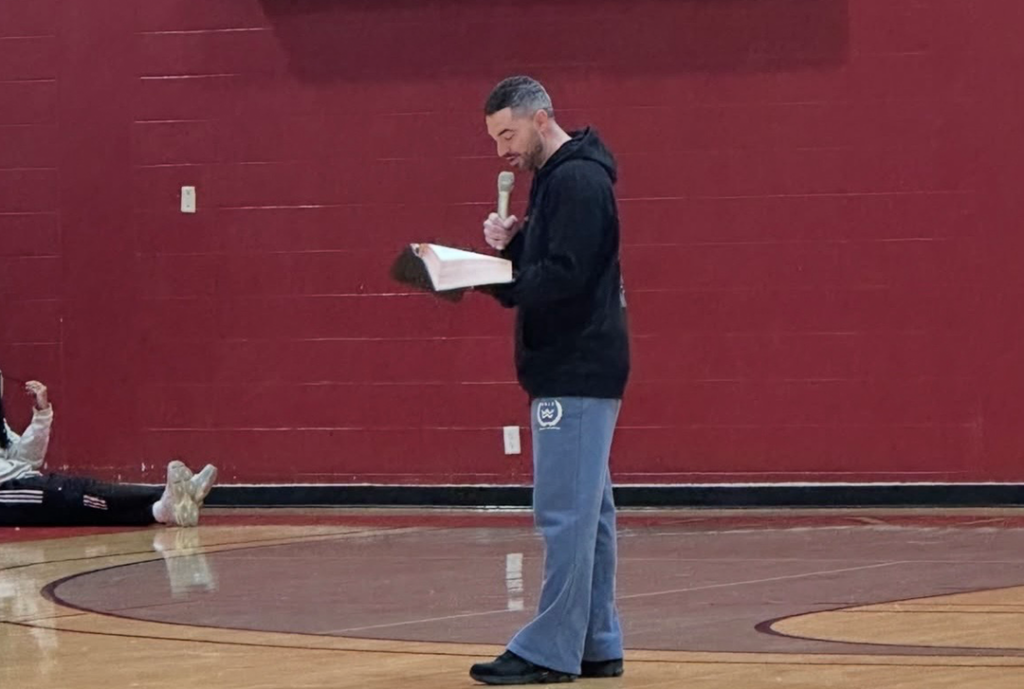Hollywood is often criticized in religious circles as lacking moral scruples. Yet there’s a contingent in the entertainment industry that takes right and wrong seriously.
Nearly 200 people involved in the entertainment industry — many of them committed Christians — gathered Aug. 12 in Beverly Hills, Calif., for a first-time conference titled “Content and Conscience: Toward Ethics of Screenwriting.”
Mostly writers attended the conference at the Writers Guild Theater, but a smattering of producers, directors and actors also appeared. They came to wrestle with complexities of producing honest and compelling entertainment that affirms Judeo-Christian values in the secular media.
“The Columbine incident was a watershed moment for this industry,” said conference coordinator Jimmy Duke. “It made writers and producers stop and wonder if they have something to do with this situation.”
Conference moderator Miguel Valenti, author of the book “More Than a Movie: Ethics in Entertainment,” noted that while almost every professional field has a code of ethics, Hollywood is completely lacking any such standard. Considering the fact that the media is arguably the most socializing force in society, Valenti said it’s apparent that ethics must be addressed.
The conference was sponsored by Inter-Mission, a nonprofit organization of more than 3,200 entertainment professionals in Hollywood and New York City. Inter-Mission is based in the First Presbyterian Church of Hollywood and exists to encourage Christians to pursue excellence in television, film and theater.
“The goal of this conference was to start the dialogue,” Duke explained. “It’s very important for us as Christians to be a part of the solutions in Hollywood, not the problems. So often the Christian church wants to stand outside and criticize but not do anything about it. We don’t engage pop culture.”
One of the tenets of Inter-Mission is to establish and strengthen a Christian presence within the industry in order to slowly influence Hollywood from the inside. Through its “Act One“ program, Christian writers are trained in the art of screenwriting.
“We believe that in order to effect change we have to be on the inside of the industry, so first we strive for excellence,” said Duke. “Nothing preaches the gospel more than excellence.”
Duke said the conference on ethics came out of previous training seminars held for Act One students. Students said they needed more than just tools to hone their craft; they had to talk about the ethics of writing screenplays.
The collection of Hollywood hopefuls and insiders who attended Content and Conscience dealt with the paradoxes of being a Christian in the entertainment industry: Is it possible for Christians to produce screenplays that include the realities of sin? If so, how? And, assuming that a Christian can write such a script, is it possible to produce a moral story when much of Hollywood seems to revel in debauchery?
“I’m trying to understand how to make my Christian faith real in the writing that I do,” said Steve Storm, a 29-year-old screenwriter. “I’m trying to figure out how to address violence and personal sexuality and things that involve the sin nature, and at the same time encourage people. If we’re going to be truthful, we have to talk about sin. But at the same time there are certain ways of talking about truth that are damaging and other ways that are edifying and healing. I want to be sure that I’m not doing damage to the viewing public.”
One featured speaker at the conference was David Gushee, a professor of moral philosophy at Baptist-affiliated Union University in Jackson, Tenn. Gushee said one test for any professional to assess her success is to consider the social impact of her work.
Screenwriters are in the unique position of being the creators of projects that can have worldwide impact, Gushee said. He encouraged writers to make their work “soul refining,” as opposed to “soul coarsening.”
“Refining the soul is about maximizing what it means to be human as God intended,” said Gushee. “It’s really the opposite of coarsening“ content, he said, which could be defined as brutish, violent, vulgar, lacking sensitivity and joy, and making little of human potential.
Soul refining “is an appreciation of the human condition,” Gushee explained. “It has to do with depicting love in something of its depth. Depicting sorrow and grief in their depth. Portraying evil, death, moral goodness, moral blindness à getting at the dimension of human behavior and human society.”
A dilemma facing Christian writers is how to deal with sinful elements in a productive way. Three issues at the conference’s forefront were the use of sex, violence and profanity in telling stories.
“I think that there is something so private about sex that probably the more explicitly you depict it the less likely it is to be soul refining,” said Gushee.
On the other hand, “If you have a film that communicates that violence is evil, and it creates suffering, and it’s evil, that can be soul refining,” he said. “I think that ’Schindler’s List’ and ’Saving Private Ryan’ did that.”
Conference attendees agreed it was a positive experience to meet and discuss the challenges of ethical screenwriting. They left without easy answers, but they were encouraged to continue their struggle both as individual artists and as a community to create compelling stories that both entertain and edify.
“I work with children a lot, and I know that what goes on in movies is the complete opposite of what I’m teaching them,” said Angel McElhaney, a young screenwriter and educator from Georgia. “I’ve wondered if it’s possible to put on the screen an exciting, great, loving movie that kids could watch that I would be proud to say I wrote.” (ABP)





Share with others: